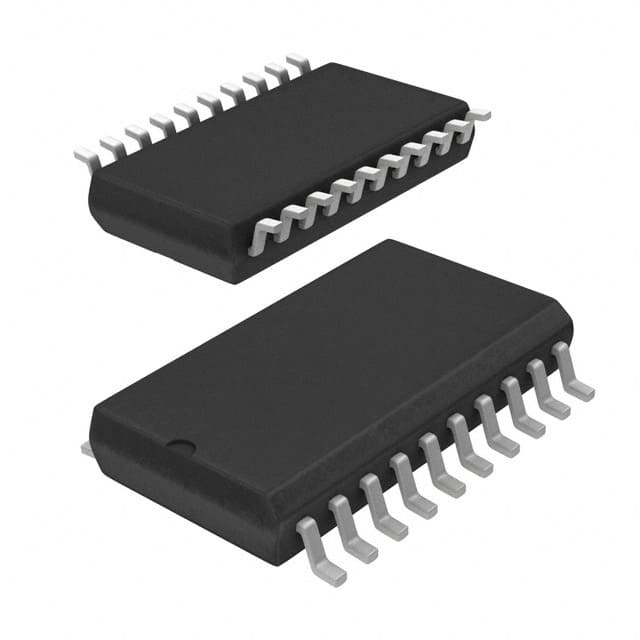Lihat spesifikasi untuk detail produk.

CD74HCT541M96
Product Overview
- Category: Integrated Circuit
- Use: Logic Level Shifter
- Characteristics: High-Speed, CMOS Technology
- Package: SOIC-20
- Essence: Octal Buffer/Line Driver with 3-State Outputs
- Packaging/Quantity: Tape and Reel, 2500 pieces per reel
Specifications
- Supply Voltage Range: 4.5V to 5.5V
- Input Voltage Range: 0V to VCC
- Output Voltage Range: 0V to VCC
- Maximum Input Current: ±1µA
- Maximum Output Current: ±6mA
- Propagation Delay Time: 13ns (typical)
- Operating Temperature Range: -40°C to +85°C
Detailed Pin Configuration
The CD74HCT541M96 has a total of 20 pins arranged as follows:
- GND (Ground)
- A1 (Input A1)
- B1 (Input B1)
- Y1 (Output Y1)
- A2 (Input A2)
- B2 (Input B2)
- Y2 (Output Y2)
- A3 (Input A3)
- B3 (Input B3)
- Y3 (Output Y3)
- A4 (Input A4)
- B4 (Input B4)
- Y4 (Output Y4)
- OE (Output Enable)
- GND (Ground)
- Y5 (Output Y5)
- A5 (Input A5)
- B5 (Input B5)
- Y6 (Output Y6)
- VCC (Supply Voltage)
Functional Features
- Octal buffer/line driver with 3-state outputs
- Non-inverting outputs
- High-speed operation
- CMOS technology for low power consumption
- 3-state outputs allow multiple devices to share a common bus
Advantages and Disadvantages
Advantages: - High-speed operation enables efficient data transfer - CMOS technology ensures low power consumption - 3-state outputs facilitate bus sharing among multiple devices
Disadvantages: - Limited supply voltage range (4.5V to 5.5V) - Maximum output current may not be sufficient for certain applications
Working Principles
The CD74HCT541M96 is designed to act as an octal buffer/line driver with 3-state outputs. It operates using CMOS technology, which provides high-speed performance while consuming minimal power. The device features non-inverting outputs, allowing for easy integration into various digital systems.
The 3-state outputs enable the CD74HCT541M96 to connect to a shared bus, where multiple devices can transmit or receive data. When the output enable (OE) pin is high, the outputs are active and reflect the input signals. Conversely, when OE is low, the outputs enter a high-impedance state, effectively disconnecting them from the bus.
Detailed Application Field Plans
The CD74HCT541M96 finds applications in various digital systems that require logic level shifting and signal buffering. Some specific application areas include:
Microcontroller interfacing: The device can be used to interface microcontrollers with different voltage levels, ensuring compatibility between different components of a system.
Data communication: It can be employed in communication systems to buffer and shift logic levels between different modules, such as UART, SPI, or I2C interfaces.
Memory systems: The CD74HCT541M96 can be utilized in memory systems to enable bidirectional data transfer between memory modules and other components.
Industrial automation: It can be integrated into industrial automation systems to interface between different control modules, ensuring reliable and efficient data transmission.
Detailed and Complete Alternative Models
- SN74HCT541: Similar octal buffer/line driver with 3-state outputs, offered by Texas Instruments.
- MC74HCT541: Octal non-inverting buffer/line driver with 3-state outputs, provided by ON Semiconductor.
- CD74HC540: Octal buffer/line driver with 3-state outputs, available from Texas Instruments.
These alternative models offer similar functionality and can be considered as substitutes for the CD74HCT541M96 based on specific requirements and availability.
Word count: 510 words
Sebutkan 10 pertanyaan dan jawaban umum terkait penerapan CD74HCT541M96 dalam solusi teknis
Sure! Here are 10 common questions and answers related to the application of CD74HCT541M96 in technical solutions:
Q: What is CD74HCT541M96? A: CD74HCT541M96 is a high-speed CMOS octal buffer/line driver with 3-state outputs, commonly used in digital logic circuits.
Q: What is the operating voltage range for CD74HCT541M96? A: The operating voltage range for CD74HCT541M96 is typically between 4.5V and 5.5V.
Q: What is the maximum output current that CD74HCT541M96 can drive? A: CD74HCT541M96 can drive up to 6mA of output current per channel.
Q: Can CD74HCT541M96 be used for level shifting applications? A: Yes, CD74HCT541M96 can be used for level shifting as it supports both TTL and CMOS input voltage levels.
Q: How many channels does CD74HCT541M96 have? A: CD74HCT541M96 has 8 channels, which means it can drive up to 8 separate signals.
Q: What is the maximum propagation delay of CD74HCT541M96? A: The maximum propagation delay of CD74HCT541M96 is typically around 15ns.
Q: Can CD74HCT541M96 be used for bidirectional data transfer? A: No, CD74HCT541M96 is a unidirectional buffer and cannot be used for bidirectional data transfer. For bidirectional data transfer, you would need a different type of IC like a transceiver.
Q: What is the power supply current requirement for CD74HCT541M96? A: The power supply current requirement for CD74HCT541M96 is typically around 10mA.
Q: Can CD74HCT541M96 be used in high-speed applications? A: Yes, CD74HCT541M96 is designed for high-speed operation and can be used in applications with fast switching requirements.
Q: Is CD74HCT541M96 available in different package options? A: Yes, CD74HCT541M96 is available in various package options, such as SOIC, TSSOP, and PDIP, to suit different PCB layout requirements.
Please note that these answers are general and may vary depending on the specific datasheet and manufacturer's specifications for CD74HCT541M96.

